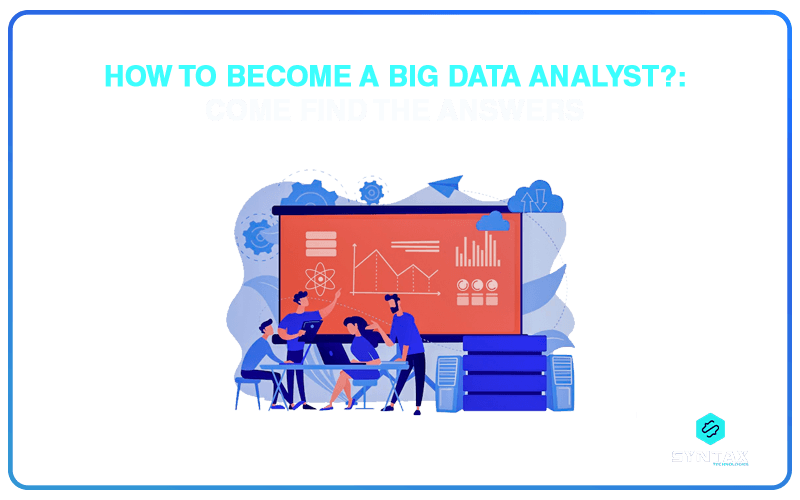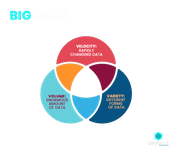Data is the New Science. Big Data holds the Answers. – Pat Gelsinger
When we talk about the Data Boom, it is simply not enough to refer to a process of generation of Data at an unimaginable rate. In this new trend, Data has a peculiar nature. This has helped it to earn the prefix ?Big? to it.
While we shall look at what exactly is Big Data, subsequently; it is important to understand that Big Data is not as simple as traditional Data. Consequently, the role of a Big Data Analyst too happens to be different from a traditional Data Analyst.
While Data Analysts deal with largely Structured Data; Big Data Analysts are responsible for handling Big Data which involves Unstructured Data, Semi-Structured as well as Raw Data.
Moreover, since ?the world is one Big Data problem? (Andrew McAfee), it will only be expected from young aspiring professionals to search for answers to the question of How to become a Big Data Analyst.
Additionally, there are numerous aspiring data analysts who happen to lack formal experience or a conventional STEM degree. So what choice do they have to become a data analyst? Find answers here:
“How to Become a Data Analyst Without a Degree?: A Step-by-Step Guide“
“How to Become a Data Analyst with No Experience?: Know with Us“
In this blog, we shall try to find answers to the question of how to become a Big Data Analyst. Simultaneously, we shall try to dig into the professional designation of a Big Data Analyst, in terms of Big Data Analyst Skills, Academic Background, Big Data Analyst Jobs available as well as look at what a Big Data Analyst does in their professional capacity.
What is Big Data and who is a Big Data Analyst?
Gartner defines Big Data as essentially ?high-volume, high-velocity and high-variety information assets that demand cost-effective, innovative forms of information processing for enhanced insight and decision making?.
Over the years, a fourth property has also been attributed to Big Data and that being ?veracity?. Veracity refers to poor quality unverified data, derived from uncertain and unauthorized sources.
Such data in itself might result in contradictory results and unreliable outcomes. Hence there is a need to leverage such unrefined Data making them suitable for big data analytics. This is the task of Big Data Analysts.
A Big Data Analyst is a professional who is responsible for extracting insights from large and complex data sets using advanced analytical (data analysis) and statistical techniques.
They are skilled in working with big data technologies and tools, such as Hadoop, Spark, and NoSQL databases, and are knowledgeable in programming languages like Python, R, and SQL.
Big Data Analysts are skilled data analysts who work with large data sets to identify patterns, trends, and correlations, and provide recommendations to businesses and organizations.
They play a critical role in helping companies make data-driven decisions, optimize business processes, and improve overall performance.
In understanding what a Big Data Analyst does, it is important to remember that the role of a Big Data Analyst comes quite close to that of Data Scientists.
Both professionals are responsible for the acquisition, cleaning, processing and analysis of Big Data.
Subsequently, they seek to comprehend the insights derived from the analysis of Data in order to transform them into actionable strategies for business decision-making.
Consequently, they are liable to report and visualize their findings through highly comprehensible forms of Data Visualization.
A Big Data Analyst is also a professional who is responsible for conducting competitive market analysis tasks for detecting prime industry trends.
Big Data Analyst Skills
Any answer to the question of how to become a Big Data Analyst cannot be adequately dealt without understanding the key competencies and expertise required in Big Data Analytics Jobs.
- Mathematical Skills
In order to analyze data, Big Data Analysts are required to have exceptional mathematical expertise, especially in the domains of Statistics, Multivariable Calculus, Hypothesis Testing, Linear Algebra, Time Series and Longitudinal Analysis, Probability Distribution, Bayesian Analysis and others.
- Data Warehousing
Under the premise of Big Data Analyst roles, it will be important for you to understand how data is stored and how to access it.
Competency in working with relational as well as non-relational databases is a must. This includes proficiency in HDFS, Cassandra, Oracle, MangoDB, DB2, MySQL and NoSQL, CouchDB, HBase and so on.
- Programming Languages
Coding Skills are an important requirement for Big Data Analysts. Proficiency in Programming Languages, at least in some of the most important ones, like Java, R and Python is crucial.
Additionally, as data professionals, if you strive to learn certain other languages as well, like C++, Ruby, Julia, Scala, MATLAB, SPSS , it will only add to your competitive edge.
- Understanding of Computation Frameworks
As a Big Data Analyst, it will be important for you to have an in-depth understanding of Computation Frameworks such as Hadoop, Apache Spark, Apache Storm, Apache Samza and Apache Flink. These frameworks help in providing for smooth processing of Big Data.
- Industry Experience and Business Acumen
As you seek to understand how to become a Big Data Analyst, you should remember that you should broaden your focus.
You cannot proceed with Data Analysis process within a particular industry, unless you possess a thorough understanding of the industry itself.
An in-depth understanding of the domain helps one to refine the questions being asked, as well as conduct meaningful research.
In fact, any attempt at utilizing the Data insights for transforming business for the better, cannot be successful without a thorough understanding of the business world.
- Data Visualization Skills
As a Big Data Analyst, who is shouldered with the responsibility of analyzing huge volumes of Data; your findings and conclusions will make no sense, unless you are able to present them in the most comprehensible and aesthetically pleasing manner. This entails the need to be proficient in different Data Visualization tools.
Tableau and Power BI happen to be two of the prominent Data Visualization tools in the market. If you wish to know more about which one will be a better choice, do read our blog on Power BI vs. Tableau: A Detailed Analysis.
- Communication Skills
The answer to the question of what a Big Data Analyst does, will be incomplete without taking into account the professional role of a Big Data Analyst in communicating findings and in maintaining liaison with other departments and stakeholders.
This entails the need to possess excellent written and verbal communication skills. This shall help you in being understandable as well as approachable.
Big Data Analyst Job Description
In your initial attempt to understand how to become a Big Data Analyst, you must have developed a fair understanding of some of the most important Big Data Analyst Skills, by now.
Now, let us look at some of the professional role and responsibilities which you must perform as a part of Big Data Analyst Jobs.
- Identifying new Data Sources and developing strategies for Data Mining, Data Analysis and Data Reporting
- Acquire Data from different sources. Perform Data Cleaning, Organize and Process it and eventually perform Data Analytics in order to derive meaningful Insights
- Creating Data definitions for new database files and Writing SQL queries for the purpose of extracting Data from Data Warehouse
- Developing Relational Databases as well as Regulating the performance of Data Mining systems
- Discerning Correlational Patterns and Tracking Trends in Complex Datasets
- Creating Reports and Visualizations to communicate Findings and Insights.
- Making use of Statistical Methods for conducting Consumer Data Research and Analysis
- Developing Innovative Analytical Tools in collaboration with Data Scientists
- Working in collaboration with the Business Management and the IT Team for identifying and accomplishing the objectives of the business organization
- Conducting regular Routine Activities for facilitating day-to-day Business activities
- Investigating and Troubleshooting Data-related problems
- Designing and Implementing Processes and Systems to improve Data Quality.
- Staying informed about emerging technologies and trends in data analytics
Big Data Analyst Salary
A Big Data Analyst commands extremely lucrative remuneration packages. The Big Data Analyst Salary does vary from country to country and region to region; however, here we shall be focused on the country of the U.S.
In the U.S. the range for Big Data Analyst Salary is between $75,000 and $130,000. This implies that the average annual salary for a Big Data Analyst is $82,000.
How to become a Big Data Analyst?: Step by Step Guide
In this section, we shall seek to deal with the question of how to become a Big Data Analyst, at length.
Acquire a Bachelor?s degree in a relevant field, possible with STEM (Science, Technology, Engineering or Math) background
Graduation in a relevant academic discipline with specialization in STEM subjects can be a big career boost for individuals aspiring to be a Big Data Analyst.
Knowledge of STEM disciplines is regarded to be crucial in terms of imparting understanding of the basics of Data Science, including that of Statistics, Mathematics, Programming and Computer Science.
Acquiring Relevant Skills
As you seek to know how to become a Big Data Engineer; it is important to remember that the first step towards achieving your goal is quite likely to begin with you, acquiring skills in consonance with the demands of the field of Big Data Analytics.
As such, Big Data Analysts are IT professionals who possess an optimum mixture of technical/hard as well as non-technical/soft skills.
Some of these most important Big Data Analyst Skills have been highlighted in the sections above.
Look for Entry-Level Jobs and Internships
While it is good to keep honing your skills and indulge in live projects and case studies; it is equally important to acquire hands-on experience of what it is really like to work as a Big Data Analyst in the real world.
You can gain the taste of the same through applying for internships and entry level data analyst jobs which would help you get the hang of the profession you are eventually aspiring to be a part of.
Internship programs in Data Analysis can be a great start. Similarly, in-house training programs in Statistical Analysis, Big Data Management and so on, can be of huge help too.
Earn Advanced Degree/Certifications
Advanced degrees like Masters in Big Data Management, Data Analytics or Data Science, can be a huge plus point as it will add a competitive edge to your resume as well as will open up considerable new opportunities for you within the domain of Big Data Analyst jobs.
On the contrary, if you do not have an advanced degree, you can take recourse to acquiring Big Data Analysts Certification which can help you begin your journey in the field.
Similarly, you can also opt for getting enrolled into bootcamps which provide a cost effective solution to earning Big Data Analyst Certification and developing skills in technical fields.
Syntax Technologies, provide you with exactly such an exciting opportunity where we help you initiate your career as a Big Data Analyst.
Conclusion
Given the rapidly expanding domain of Data Analytics, there are ample career opportunities for you as an aspiring Big Data Analyst. Being guaranteed handsome remuneration packages and considerable opportunities for growth; the question of how to become a Big Data Analyst, is a logical query. This article provides you with a rough career roadmap on the same.




